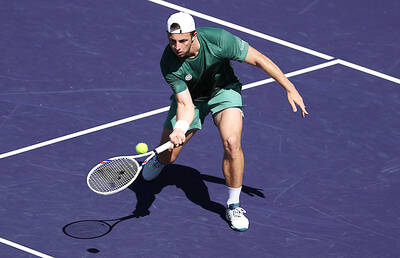David Beckham has finally achieved his goal of bringing Major League Soccer (MSL) to Miami, but the prospect of a stadium without parking that drives up housing costs in a low-income neighborhood is no hit with residents.
The former England captain and glitzy star of storied Champions League teams was on Monday formally awarded an MLS franchise, but key details remain up in the air, such as its name and logo and when it will debut.
For the 25,000-stadium, the investor group led by Beckham has acquired land in an area called Overtown, a working-class district between downtown and Little Havana.
They still need to buy one more piece of land, but for now the deal is held up in court by a lawsuit. The investors are confident they will prevail.
“Our 24th team now is in Miami. The stadium is in the Overtown site,” MLS commissioner Don Garber said.
One problem is that Miami is already choked with traffic and the stadium will not have its own parking lots.
And people in the neighborhood fear housing costs that are already rising will force them to move away as they keep going up.
“We are largely overwhelmed by the larger forces in the community that are out there. Our voices are not being heard sufficiently,” said Ernest Martin, a member of the Miami River Commission, an association of people living near the waterway.
Martin was especially critical of the lack of parking.
However, Miami-Dade County Mayor Carlos Gimenez said that although the stadium itself would not have on-site parking, there are plenty of big lots two to three blocks from the planned arena.
He also pointed to public transport, but people in Miami love their cars.
The problem of rising housing costs comes with gentrification. Overtown is a black-majority neighborhood of about 13,000 people, and 24 percent of the residents earn less than US$10,000 a year, well below the poverty level.
“This has been a low-income housing area for many years,” Martin told reporters at his home along the river.
“Ultimately the big increase in rent for the area will cause Overtown to become a more select area for residential users,” he added.
The barren lot of land where the stadium is supposed to go up is surrounded by a fence on which neighbors have hung a sign that reads: “No to the stadium.”
Nearby are modest apartment buildings and a few shops. At a corner liquor store, the cashier tends to customers from behind bullet proof glass. The storefront is protected by iron bars.
Douglas Romero, a 27-year-old resident of Overtown, said that this year his rent has already gone from US$1,050 a month to US$1,200.
“I’m a little worried, you know,” Romero said, holding his four-year-old son. “The prices of rent have been going up lately, starting in January. The only thing would be, if prices go up, you know, everybody looks to move. Everybody looks for somewhere else.”
It is not even the city’s first tryst with MLS.
Its first team, Miami Fusion, made their debut in 1998, but only played for four seasons before being cut from the league after the 2001 campaign amid low ticket sales and the lowest revenues of any team in the competition.
Soccer in the US is nowhere near as popular as baseball, basketball or American football, but Beckham and his fellow investors are counting on the cultural diversity of Miami — with its large Hispanic and Caribbean populations — to attract fans.
And not all in the neighborhood are against the newcomers.
“Him bringing the stadium here... it’s wonderful,” said Cedric Dixon, 52. “It’s excitement. It’s changing Miami.”
Meanwhile, landscaper Williams Charlie is skeptical that the new stadium can bring jobs, but said “we need a soccer team” nonetheless.
“Beckham knows what he’s doing. I’ll go right to the game — if they don’t move us out,” Charlie said.
One sign of how deeply opposed some are is the emergence of a Facebook group against the stadium which publishes scary videos of soccer-related violence as a way of warning against the dangers of hooligans.
“It’s not a done deal!” is the slogan of the Overtown Spring Garden Community Collective.
This is true: the proposed sale of the last piece of land needed is being held up by a millionaire named Bruce Matheson, who says that the county had no right to cede the first lot without opening it up to bidding.
He lost his first battle in court, but has lodged an appeal.
Gimenez remains bullish.
“We are very confident that we are going to win the lawsuit,” he said.

SIBLING RIVALRY: Marc Marquez was locked in a duel with his little brother, falling behind at one point before recovering for his first season-opening victory since 2014 Six-time world champion Marc Marquez yesterday won the MotoGP season-opening Thailand Grand Prix to complete a dominant debut weekend at his new Ducati Lenovo Team, having also romped to Saturday’s sprint. The Spanish great took the 26-lap grand prix by 1.732 seconds for his 63rd MotoGP victory from younger brother Alex Marquez, who is still seeking a first checkered flag, with Francesco Bagnaia third to complete an all-Ducati podium. It completed a perfect weekend for Marc Marquez, who took pole position, the sprint victory and the grand prix win for a maximum 37 points to open the 22-leg 2025 campaign. He led from

Tallon Griekspoor on Friday stunned top seed Alexander Zverev 4-6, 7-6 (7/5), 7-6 (7/4) in the second round at Indian Wells, avenging a devastating loss to the German at Roland Garros last year. Zverev, the world No. 2 who is heading the field of the prestigious ATP Masters event with No. 1 Jannik Sinner serving a three-month drugs ban, is the first Indian Wells men’s top seed to lose his opening match since Andy Murray in 2017. It was a cherished win for Griekspoor, who had lost five straight matches — including four last year — to the German. That included a five-setter

Donovan Mitchell on Wednesday scored 26 points as the Cleveland Cavaliers punched their ticket to the NBA playoffs with a hard-fought 112-107 victory over the Miami Heat. A seesaw battle in Cleveland saw the Heat threaten to end the Cavs’ 11-game unbeaten streak after opening up a seven-point lead late in the fourth quarter, but the Cavs clawed back the deficit in the closing minutes to seal their 12th straight victory and a place in the post-season. The Cavaliers improved to 52-10, maintaining their stranglehold on the Eastern Conference with 20 games of the regular season remaining. Mitchell was one of six Cleveland

VALUABLE POINT: Relegation-threatened Valencia snatched a thrilling 3-3 draw at CA Osasuna thanks to a remarkable backheel volley by Umar Sadiq Barcelona on Sunday secured a comfortable 4-0 win over Real Sociedad to move back top of La Liga. Aritz Elustondo’s early red card gave Hansi Flick’s side a comfortable afternoon, with Gerard Martin, Marc Casado, Ronald Araujo and Robert Lewandowski on the score sheet. Atletico Madrid beat Athletic Bilbao on Saturday to temporarily knock the Catalans from their perch, while Real Madrid, third, lost at Real Betis Balompie. Flick was able to rotate his side a little ahead of the UEFA Champions League round-of-16 visit to face SL Benfica tomorrow and still move one point above Atletico. “There were a lot of things that